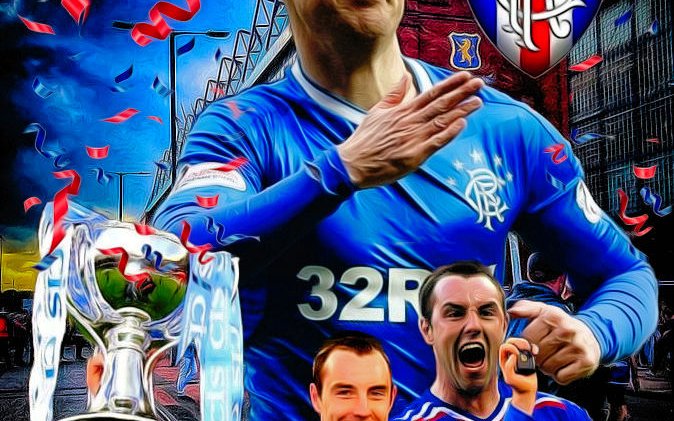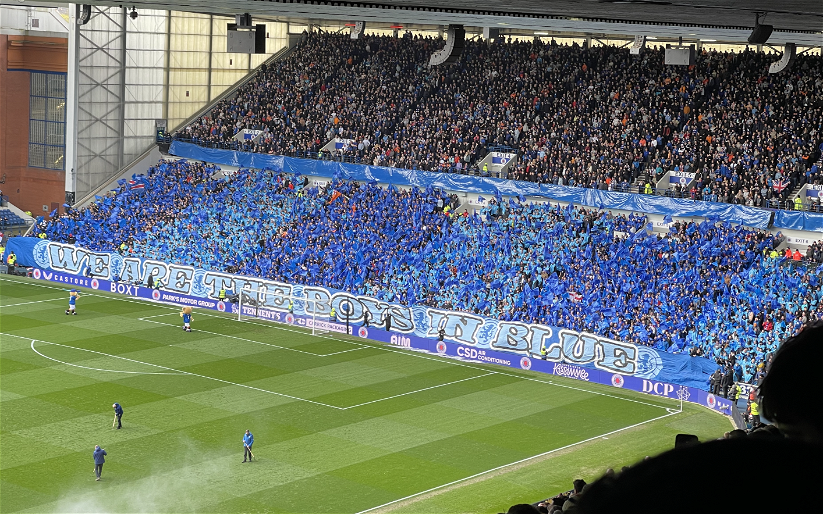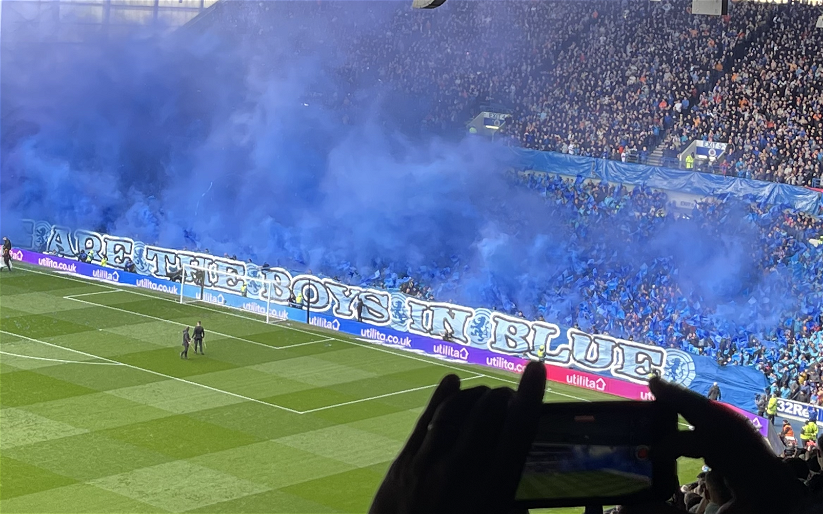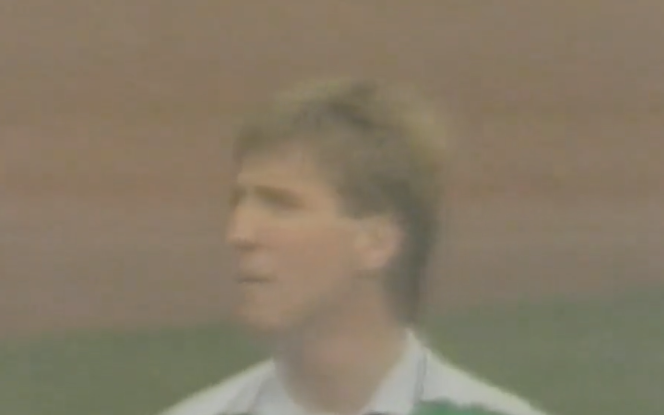By Alistair Aird
STRIKERS
The fine start to the season made by Antonio Colak has been one of the shining lights in what has been a mixed and sometimes murky start to the 2022/23 campaign for Rangers. Having been heavily reliant on Alfredo Morelos – one of only 18 players to net 100 competitive goals for Rangers since the end of World War II – to score goals, in Colak we now have different kind of striker/number nine/centre forward.
The Croatian is a penalty box predator, and you could argue we haven’t had a forward of that ilk since Kris Boyd. The career of Boyd, another post-war centurion, is highlighted in this article, which is the first of a new series in which Alistair Aird looks back at the careers of some of the prominent players that have fulfilled the role of ‘goalscorer’ with Rangers.
In addition to Boyd, another of our recent regular goal grabbers, Kenny Miller, is also featured.
KRIS BOYD (2006 – 2010, 2014-2015)
When Alex McLeish persuaded the Rangers board to part with £400,000 to bring Kris Boyd to Rangers in January 2006, the Rangers manager was cutting a beleaguered figure. Although he had made history by guiding his side to the knockout stages of the Champions League, domestic form was woeful. He needed a goalscorer, and in Boyd he most certainly got one.
After the heroics of Helicopter Sunday, Rangers’ title defence in season 2005/06 had started off somewhat unevenly. Despite beating Celtic 3-1 at Ibrox, McLeish’s men lost three of their opening eight league games, and after defeating Motherwell 2-0 at home in late October, Rangers went SIX league games without a win. Despite being able to call upon a striker who had scored in the English Premiership, Francis Jeffers, and a rarely remembered Argentinian striker called Federico Nieto, Rangers were struggling. Jeffers, AKA ‘The Fox in the Box’ didn’t register a league goal for the club, while Nieto, on loan from Almagro, scored only three times in a blue jersey, and two of them were in a League Cup win over Clyde.
Boyd had blazed a trail with Kilmarnock, making his debut for the Ayrshire side on the last day of season 2000/01. He came on as sub for another Rangers centurion, Ally McCoist, who was making the final appearance of his goal-laden career.
Over the next four seasons, the Irvine-born striker established himself as a goalscorer, finding the back of the net 67 times in 168 appearances for the Rugby Park side. But it was a league match against Dundee United that really shot Boyd to prominence.
He had only netted once in the opening five league matches, but on 25 September 2004, he netted five goals as Kilmarnock thrashed United 5-2. Boyd ended the campaign with 19 goals in 35 appearances, and when he kicked on at the start of season 2005/06 – netting 17 times in 20 appearances – Rangers made their move.
Boyd’s Ibrox impact was immediate. He scored a hat trick on his debut against Peterhead in the Scottish Cup and scored twice in a 4-1 win over Livingston two weeks later to open his league account. Although he added goals to the team, Boyd’s arrival was never going to help Rangers challenge Celtic for the title, but in the 17 league matches he played in the latter part of the season, he scored 17 goals. Included in that haul was a hat trick against Dundee United at Tannadice.
The start of Boyd’s first full season at Rangers was supposed to be the dawn of an exciting new era. Paul Le Guen was appointed as manager and there were high hopes that Rangers wouldn’t just reign supreme in Scotland but also make a challenge for honours in Europe too. Neither transpired. The appointment was a disaster and Boyd was one of many players who didn’t find favour with the Frenchman.
Although he played a part in 17 of the first 18 league matches, Boyd only completed the full match in five of them. It was rumoured that Monsieur Le Guen wasn’t too enamoured with Boyd’s work ethic, and after he was withdrawn at half-time during a 1-0 defeat against Falkirk, Boyd was dropped.
Jettisoning the best goalscorer in the squad at a time when Rangers were struggling was bad enough, but Le Guen also fell out with the club captain, Barry Ferguson.
Ferguson was eventually axed too, but his absence would be brief. He missed out on a trip to Fir Park where Boyd – back in the starting XI – scored the only goal of the game. And if there were ever any doubts where Boyd’s allegiances lay then they were dispelled when he held up six fingers as he celebrated his goal, the number six being synonymous with the jersey Ferguson cherished so much. The captain had the backing of the players, the time had come for Le Guen to say au revoir.
Walter Smith returned for a second spell in charge, and he not only reinvigorated Rangers, but he got Boyd back on the goal trail too. The goal against Motherwell was Boyd’s tenth in the league, and he added another ten to his tally, including hat tricks against Kilmarnock and Aberdeen and what would prove to be his only goal for Rangers against Celtic.
The season also featured a first goal in European competition, Boyd among the scorers as Rangers beat the Italian side AS Livorno in the UEFA Cup Group stages. He added others against Auxerre and Hapoel Tel Aviv, but that would be the sum total of his goals in Continental competition as a Rangers player. Even under Smith, he was often left out of the XI for European matches, and only made 19 appearances in total, 11 of which came in his first season-and-a-half at Ibrox.
But domestically few could match Boyd when it came to scoring goals. Season 2007/08 brought 25 goals in 37 domestic appearances and were it not for the predatory intervention of Boyd then the League Cup Final that season against Dundee United would have ended in defeat. Twice Boyd scored to draw Rangers level and in the penalty decider, it was his kick that proved decisive. He also scored twice again in the Scottish Cup Final, a matter of days after he had only been given the final four minutes to try and do what he did best to claw back the one-goal deficit that Rangers faced in the UEFA Cup Final in Manchester. Had he been given longer then perhaps the trophy would have been bound for Glasgow rather than Saint Petersburg.
Season 2008/09 saw Boyd team up with the returning Kenny Miller to fire Rangers to their first title since 2004/05. Boyd’s 25 league goals featured five doubles and two hat tricks, while Miller notched 10 goals to secure the first of three successive titles. Boyd added another three goals in the League Cup, but it was his solitary goal in the Scottish Cup in a 3-0 semi-final win over St Mirren that saw him become the first Rangers goalscoring post-war centurion since Mark Hateley. Remarkably, Boyd had hit the hundred in just 141 appearances.
Season 2009/10 would be the last of Boyd’s first spell at Rangers. With 18 months remaining on his contract, he had seemed set for a bumper move to Birmingham City in January 2009, but that fell through. He stayed on at Ibrox, but pen was never put to paper on a new deal.
As the season progressed, Boyd continued to find the net regularly, and on 30 December he supplanted Henrik Larsson as the leading goalscorer in the Scottish Premier League. Larsson had netted 158 league goals for Celtic, but Boyd’s five goals against Dundee United that night took him to 160.
The rest of the season was hampered by a hernia injury, but Boyd still found time to clock up his 100th league goal for Rangers when he netted the opening goal against Dundee United on 1 May. It was Boyd’s first league goal since February, but it would be his second-last Premier League goal for Rangers. He opened the scoring in a 3-3 draw against Motherwell on the last day of the season, but with both parties unable to come to an agreement on a new contract, Boyd left Rangers to join Middlesbrough.
The move to Teeside kicked off a nomadic spell in Boyd’s career. He couldn’t quite find the form he had shown in Scotland when he crossed the border, scoring just six times in 29 appearances for Boro. A loan spell at Nottingham Forest gave a bit more of a yield – six goals in 12 games – but at the end of season 2010/11, Boyd somewhat bizarrely decided to join Eskisehirspor in Turkey. He made only two appearances in the Süper Lig before crossing the Atlantic to join Portland Timbers.
After seven goals in 27 appearances, Boyd returned to Scotland and signed for Kilmarnock. And following a stellar season in 2013/14, Ally McCoist brought Boyd back to Rangers in the summer of 2014. McCoist was looking to team Boyd and Kenny Miller up once again in attack in a bid to complete the final stage of the journey back to the top flight. It didn’t work. Boyd netted only three goals in 29 league games and returned to Kilmarnock after failing to score in the three Premiership play-off appearances he made.
But the ill-fated second spell shouldn’t cloud Boyd’s contribution to the club. In his first spell at Rangers, his goals helped him to pick up two league titles, two League Cups and two Scottish Cups. And while you were never going to get a Morelos-esque shift out of him, put the ball into the box and he was sharp as a tack. He was an instinctive finisher, and he fully merits his place among the centurions.
His Rangers record reads:

KENNY MILLER (2000-2002, 2008-2011, 2014-2018)
There are numerous debates that rage among the Rangers supporters, and one of the hottest topics is where Kenny Miller ranks in terms of status in our history. A certain image of him beating a badge on his breast is enough for some to turn their noses up when it comes to affording ‘legend’ status, yet when you analyse Miller’s three spells at Rangers, you’ll find it hard to argue that he hasn’t made a significant impact and contributed to our success.
Initially signed as a promising youngster by Dick Advocaat in the summer of 2000, Miller got to learn his trade at Rangers alongside the likes of Ronald de Boer, Michael Mols and Tore Andre Flo. There is no doubt that players of that calibre helped Miller develop as a player, but they also limited his opportunities in the first team. Aside from a five-goal haul in a 7-1 win over St Mirren and a Champions League goal against AS Monaco at Ibrox, there wasn’t much to get excited about in that initial two-year stint, and in September 2001, he joined Wolverhampton Wanderers on loan. By the end of the year the move was made permanent, and rather than rot in the reserves at Rangers, Miller set about scoring goals in the Black Country to try and help take Wolves into the Premiership.
He achieved that goal, netting 19 times in season 2002/03 as Wolves ascended to the top flight via the play-offs. Miller’s final goal of the season was in the play-off final against Sheffield United, but it took him some time to adjust to life in the elite league in England. He didn’t score in his first 12 Premiership games, but when he did break his duck, he did so in some style, netting the only goal of the game against Manchester United at Molineux in January 2004.
A week later, Miller scored again to earn a point against Liverpool, but those goals would be his sum total for the season. Wolves were relegated, and Miller had to ply his trade once again in the second tier.
He did so rather well, scoring 29 league goals over the next two seasons, but it was at that juncture that Miller’s thought process must have been hindered. When his contract expired, he elected to join a club based in the East End of Glasgow. His stay there may only have lasted a season, but that was long enough to put the proverbial black mark against his name in indelible ink for some.,
In the summer of 2007, Miller returned south when he signed for Derby County, but just a year later he was back in Glasgow and this time he chose to return to the blue half of the city.
The Miller that was returning to Rangers was a better player than the one that had left around six years earlier. He was sharper in and around the box and had better game awareness such that over the next two-and-a-half seasons, he not only scored regularly but also contributed in terms of assists too. In addition to 10 league goals in season 2008/09, he contributed 12 assists, and the following season, he added 10 more. On top of that, he scored 18 goals in 33 league appearances.
These numbers played a large part in the success Rangers enjoyed at that time, and Miller was also the match-winner when we only needed nine men to defeat St Mirren 1-0 in the 2009/10 League Cup Final.
When Kris Boyd left to join Middlesbrough in 2010, Miller assumed the goalscoring mantle and by the turn of the year, he had scored 22 goals in 25 appearances. Among those goals was another double against Celtic, his third brace against them since returning to Rangers. Nothing beats a goal against them and the undiluted joy it brings, so while Miller may not have completely exorcised the demon for some, a thaw in the icy relationship had now surely set in.
Season 2010/11 ended with another title win and success in the League Cup, but Miller wasn’t at the club to enjoy that. He decided to leave in the January transfer window to join Bursaspor, a team he had scored against in the Champions League a matter of weeks before that. That goal was one of 53 Miller netted in the 104 appearances he made during his second spell with Rangers.
By the time he returned for a third time in 2014, the landscape was somewhat different. Rangers had been demoted to the bottom tier in 2012 and were about to battle it out in the Scottish Championship for a return to the Premiership. In the intervening period, Miller had spent time with Cardiff City, for whom he played in the English League Cup Final in 2012, missing a penalty in the shoot out against Liverpool, and Vancouver Whitecaps, but he accepted a call from Ally McCoist to come back to Scotland.
Miller’s experience would be a key factor in Rangers returning to the top flight, but that would only come to the fore in season 2015/16 under Mark Warburton. In that promotion-winning season, Miller scored 21 goals in all competitions, including a hat trick against Dumbarton and the opening goal in both the Scottish Cup semi final and final.
Season 2016/17 marked Rangers’ return to the Premiership, and it was also significant for Miller as he hit his 100th goal in Rangers’ colours. That came in The Highlands on 14 October, a rasping volley after 22 minutes earning a Rangers a 1-0 win over Inverness.
Later in the season he added another couple of goals to his Old Firm tally, but the last of those came in a game that is best forgotten for several reasons. The chastening 5-1 defeat at Ibrox was the beginning of the end for Rangers’ new manager, Pedro Caixinha, too.
The Portuguese and Miller fell out in the early part of season 2017/18 after another Ibrox defeat against Celtic. Miller was subsequently dropped for the next three league matches, the last of which, a 1-1 draw at home against Kilmarnock, brought the Caixinha ‘era’ to a close.
Graeme Murty was the man entrusted with taking over the reins and one of the first decisions he made was to reinstate Miller to the team. And Miller repaid Murty’s faith in him by scoring twice and creating another in a 3-1 win over Hearts at Murrayfield.
Miller kept his place for the next seven league matches, but a ruptured Achilles tendon sustained in a 2-1 win at Easter Road on 13 December and further altercations with the management meant that Miller’s Rangers career was over. The sum total of minutes played after he was injured in Edinburgh was 135, and he added only one more goal which came in a 4-0 win over Dundee in April.
Eight days later, Miller was on the bench for the Scottish Cup semi-final against Celtic. Rangers were humbled 4-0 at Hampden – Miller wasn’t called into action – and following a frank exchange of views during the inevitable dressing room inquest after the game, Miller was suspended by the club. He never pulled on a Rangers jersey again.
It was an ignominious end for a player who, love him or loathe him, has contributed to the success Rangers have enjoyed over the years. Over three spells he made 308 appearances and scored 113 goals. And therein will lie another debate, does Miller merit a place in the 100-club? Twenty-seven of those goals came outside the major competitions (see below), but, for me, he was wearing a Rangers jersey when he scored those goals, so he deserves recognition for that.
Kenny Miller won three Scottish Premiership titles (he made sufficient appearances in season 2010/11 to claim a medal), a Scottish Championship title, one Scottish Cup, a League Cup and a Challenge Cup in his Rangers career.
His Rangers record reads:





